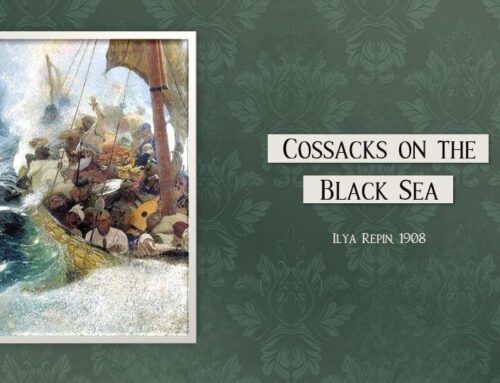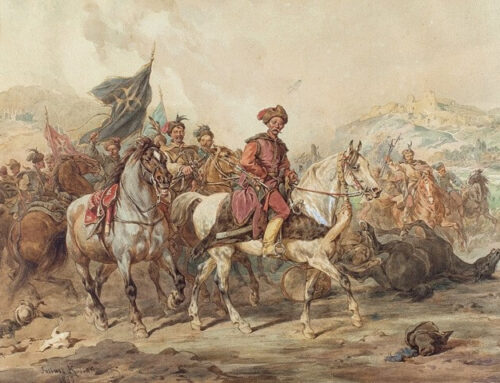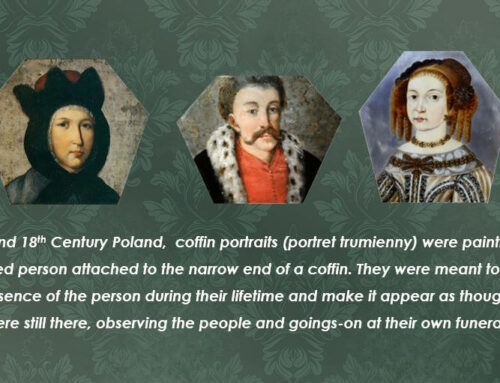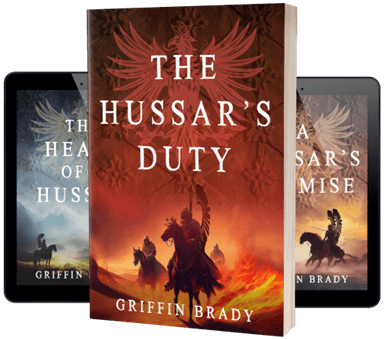Learn the historical terms and Polish words featured in The Winged Warriors Series, from weapons and military terms, to food, clothing, and more!
Beshmet – outer coat worn by Tatars
Bogurodzica – (Mother of God) Polish knight’s hymn before battle, from the Battle of Grunwald in 1410
Bork – (also “börk”) a janissary’s headgear
Buzdygan ‘Booze-de-gun’ – mace, usually wielded by a higher-ranking officer
Cham – a peasant, a lowborn person; calling a Polish nobleman a cham was an insult
Chodzony ‘Hode-zoneh’ – early name for polonez, a walking dance and Poland’s national dance
Castrum doloris – Latin for “castle of grief;” a decorated structure within a church that shelters a bier and holds candles, flowers, epitaphs, coats of arms, paintings, allegorical statues to honor the deceased
Chorągiew ‘Ho-rongev’ – company, banner, usually between 100-200 men
Chorągiew Husarka – a hussar banner or company
Chorąży ‘Hoh-ronje-ah’ – a standard bearer; usually a young, promising towarzysz selected by the commander
Commonwealth – short for Polish-Lithuanian Commonwealth; a term that refers to the United Kingdom of Poland and Duchy of Lithuania
Crown – the Kingdom of Poland
Cuirass – metal breast and back plates; armor for the torso
Czekan ‘Check-on’ – a war hammer with an axe blade on one side and hammer claw on the other
Dalej! – March on!
Dożynki ‘Doh-jin-kee’ – harvest festival
Elear – a member of a regiment that rode for the adventurer Aleksander Lisowski; also known as “Lisowczycy,” meaning lost men, forlorn hope
Ferezeya ‘Fair-ah-zay-ah’ – a nobleman’s overcoat, worn over a żupan or kontucz; sleeveless and often fur-lined
Gorget – metal neck piece; armor worn at the neck
Hajduk – foot soldier of Hungarian or Turco-Balkan background used by the Polish infantry from the 1570s to the 1630s
Heavy lancers – see husaria
Hetman – general
Husaria ‘Hoo-sah-reeah’ – heavy cavalry; Polish winged hussars
Husarski ‘Hoo-sahr-ski’ – another word for husaria
Hussar – another word for husaria
Il Tesoro Della Sanita ‘The Treasure of Health’ – a handbook for healthy living, written by the physician Castore Durante and first published in Rome in 1586; the handbook was printed in many languages and was a popular work found in many a nobleman’s home
Karwasz ‘Klah-dah-vash’ – arm iron, vambrace. Plural: kawarsze “klah-dah-vashah”
Kilij – a Turkish sabre
Kołacz – traditional Polish wedding cake or wedding bread
Kolpak – aka ‘calpac;’ a man’s fur hat
Koncerz ‘Kone-sesh’ – a tuck; a thin four-foot blade with a triangular or square cross-section used like a short lance to punch through armor
Kopia – long, hollow lance wielded by a hussar, between 13-20 feet long
Łan – fief; typically 15-30 families per fief
Letter of array – military conscription; a call for a nobleman to fulfill his military duty to the Crown
Mazurka – aka mazurek; an up-tempo Polish folk dance
Muscovites – Russians
Muscovy – Russia
Na slawa! – To glory!
Na zdrowie! ‘Nahz-drov-eeah – To your health!
Nadziak ‘Nahd-jack’ – war hammer with a hammer head on one side and a claw on the other
Namiestnik ‘Nah-mia-sneek’ – placeholder; an officer/lieutenant who fills in while the regular is away
Pacholik ‘Pahk-ho-leek’ – a retainer or squire; serves a towarzysz
Pałasz ‘Pa-wash’ – a hussar’s broadsword
Pallash – see pałasz
Pan – Lord, sir; title for a nobleman
Pancerni – medium cavalry; armored in chain mail
Pancerz – chain mail
Pani – Lady; title for a noblewoman
Pauldron – shoulder armor
Piwo ‘Pee-voh’ – beer, ale
Poczet ‘Poe-chets’ – retinue; 2-5 men (servants and retainers) who serve the towarzysz/hussar
Porucznik ‘Poh-rootz-neek’ – a commander’s second, the lieutenant
Postpolite ruszenie ‘Pos-polite roh-shanya’ – noble host, or levy of knights
Ród – clan
Rotmistrz – aka ‘rotameister;’ commander of a company of towarzysze
Sharovary – baggy trousers
Starosta – mayor, official in charge of security
Strażnik – great guard or field guard (field guards were found on the eastern borders); officer in charge of scouting and troop movement
Suka – type of fiddle
Szabla Husaria ‘Shah-blah hoo-sah-reeah’ – a hussar’s sabre; highly valued and prized. Next to the kopia, the favored weapon of a hussar
Szlachcic ‘Shlahth-cheets’ – Polish nobleman
Szlachta ‘Shlahth-dah’ – Polish nobility
Szlachta cząstkowa ‘Shlahth-dah chonse-ko-vah’ – nobility with fractional land ownership
Szlachta zamoża ‘Shlahth-dah zah-moja’ – propertied nobility
Szlachcianka ‘Shlahth-chiankah’ – noblewoman
Szyszak ‘Shu-shahk’ – lobster-tailed pot helmet
Towarzysz ‘Toe-vah-jez’ – literally a “companion” in Polish; a hussar; a nobleman of wealth, with his own armor, horses and retinue. Knight class
Towarzysze – plural of towarzysz
Tuleja ‘Too-lay-ha’ – a cup or tok mounted on the right side of a hussar’s saddle into which he slips the butt end of the kopia; acts as a sleeve
Weller – an early version of the waltz; sixteenth century; scandalous when it first appeared
Winged hussars – heavy hussars; heavy husaria; heavy lancers
Wodka – vodka
Wujek ‘Voo-yeck’ – uncle
Złote ‘Zwah-tay’ – plural form of basic Polish monetary unit
Złoty ‘Zwah-tee’ – basic Polish monetary unit
Zupa rybna ‘Zoopah rebnah’ – fish soup
Żupan ‘Jzo-pahn’ – a man’s outer garment; resembles a long coat with a high collar; buttons down the front; normally worn over trousers and a shirt









Leave A Comment